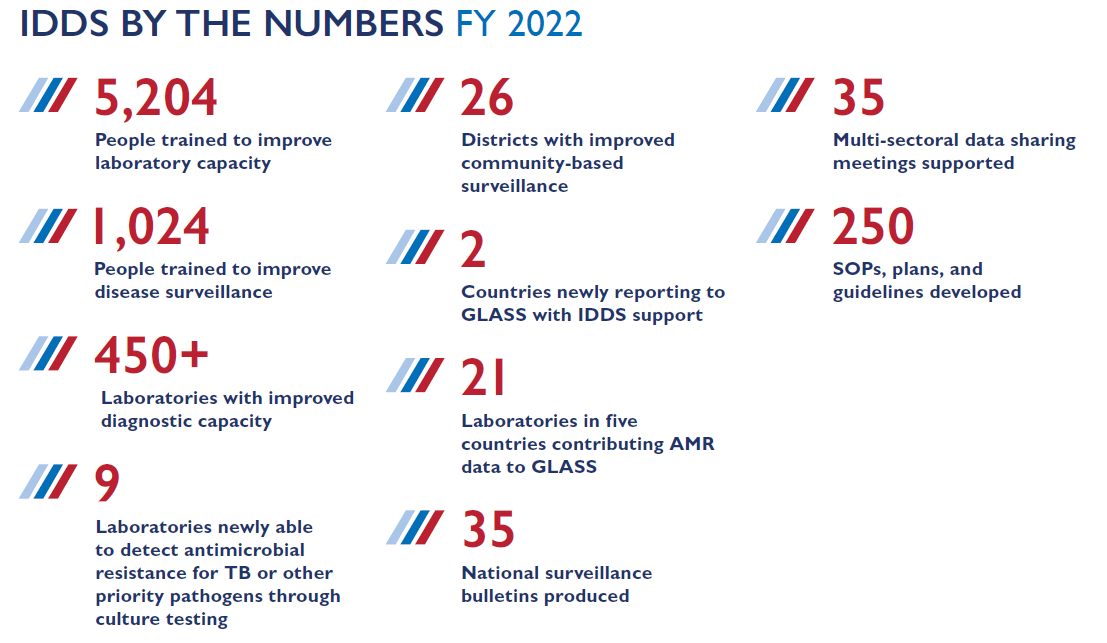Strengthening Defenses, Laboratory by Laboratory

USAID’s Infectious Disease Detection and Surveillance (IDDS) project strengthens health systems by focusing on laboratory networks. As one of the USAID Global Health Bureau’s leading diagnostic projects, IDDS has supported more than 450 laboratories to improve diagnostic accuracy and turnaround time, trained over 5,000 people on testing and surveillance, spearheaded enhancements to biosecurity and specimen transport, and expanded community access to quality laboratory services. When IDDS began in 2018, there was no way to know that its launch would coincide with a global health emergency: COVID-19. IDDS deployed experts dedicated to expanding diagnostic services and strengthening localized disease surveillance, supporting global pandemic response in more than 15 countries. Concurrently, IDDS recognized the need to integrate its rapid response into ongoing efforts to sustainably strengthen national diagnostic and surveillance systems.
Developing Networks and Partnerships
Five years later, IDDS is demonstrating its impact. An important aspect of integrating USAID’s Collaboration, Learning, and Adaptation framework into programming has been IDDS’ focus on creating country-led forums for experts to collaborate and share lessons. These forums create opportunities for infectious disease experts and other key partners to inform policy and program decisions, creating new linkages to improve diagnostic networks. In Southeast Asia, IDDS strengthened regional linkages through financial and logistical support to the Regional Public Health Laboratories Network and convened stakeholders from 11 Association of Southeast Asian Nations countries to share experiences and resources on disease detection. As COVID-19 spread, the network proved instrumental to cross-country learning and problem solving. IDDS has since sustainably localized management and coordination of the network.
Ensuring Capacity for Testing and Surveillance
IDDS builds health system capacity for detecting and responding to infectious diseases while it supports COVID-19 response. From October 2020 to September 2021, IDDS transported more than 35,400 COVID-19 specimens for testing and trained 473 people on managing and testing COVID-19 specimens. The project has trained more than 1,000 people to improve disease surveillance.
IDDS continues to invest in localized laboratory capacity and connect the dots between the many facets of a well-functioning, efficient diagnostic network and broader health system. The goal is to cement progress toward national infectious disease programs capable of rapid and effective response, informed by global best practices. In nine countries, IDDS has deployed and is institutionalizing use of Truenat, a rapid molecular test for tuberculosis for low resource settings, and will expand its rollout to additional countries in 2023. In Bangladesh, Uganda, and Vietnam, IDDS is integrating costs and processes into existing health systems through costed plans for strengthening diagnostic networks, laboratories, and organizational structures supported by domestic resources. IDDS is also building national capacity by improving digital connectivity between human and animal health disease reporting systems.
Enhancing Information Systems
National health programs need effective and integrated real-time information systems to inform decision-making. In Mali, IDDS expanded community-based surveillance to two districts, detecting four measles outbreaks and a yellow fever outbreak. The integration of community surveillance data into the national system via mobile phones is critical for future outbreaks and current response efforts.
Through these interventions and others, IDDS shapes country-based diagnostic and surveillance networks with self-sustaining capacity and supports testing networks to access needed financing and resources. By expanding diagnostic services to hard-to-reach areas and strengthening surveillance systems, IDDS is building defenses against future epidemics and pandemics, laboratory by laboratory.



